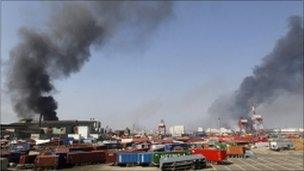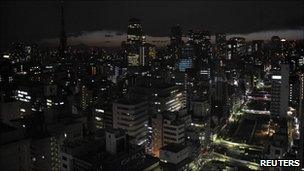Japanese exports fall 2.2% in March due to tsunami
- Published

The north-east of Japan, where major manufacturers have factories has seen major damage
Japanese exports fell more than expected in March, as damage from last month's earthquake and tsunami affected shipments.
According to the finance ministry exports declined 2.2% from a year earlier, the first drop in 16 months.
Shipments of cars tumbled 28% as the sector continued to be hit by shortfall of parts and slowdown in production.
The earthquake and tsunami has damaged factories and disrupted the supply chain.
Shipments of semiconductor products and electronics also fell by 6.9%.
For Japan's two major export destinations, shipments to the US declined 3.4% from the previous year, while shipments to China rose an annual 3.8%.
Analysts say the disruption in the supply chain is making it difficult for Japanese manufacturers to get back on track.
"It is very frustrating for automakers and other manufacturers," said Hiroshi Watanbe of Daiwa Institute of Research.
"Despite steady demand abroad, they simply could not make their products due to a supply crunch following the disasters," he added.
Worsening situation
While the Japanese economy struggles to deal with the effects of the earthquake and tsunami, analysts warn that the situation could get worse in the coming months.
They say the current numbers are not a true indicator of the full impact of the devastation on the country's exports, as many manufacturers would have used up existing inventories.
"At least for March, some manufacturers were able to keep limited output by relying on stock. But by now, stock will be gone, forcing companies to completely shut down production," said Hajime Inoue of Japan Research Institute.
Mr Inoue warned that the fall in exports could widen to as much as 20-30% in the coming months.
Analysts say that while the country has been grappling with the aftermath of the earthquake and tsunami, much works needs to be done before manufacturers can start operating at full capacity.
"There has also been damage to infrastructure, like ports and airports," said Yoshiki Shinke of Daiichi Life Research Institute.
"There hasn't been much progress in restoring factory output, so exports will fall in April," he added.
Power problems

The earthquake and tsunami has resulted in a shortage of electricity supply in Japan
One of the biggest issues crippling Japan's component makers is the shortage of power.
Last month's earthquake and tsunami has caused damage to nuclear and conventional power stations in the country, resulting in electricity supply shortages.
Japanese manufacturers are having to come up with measures to keep their production lines running while trying to cope up with a shortfall in power supply.
The situation is likely to become more complicated as the demand for electricity reaches its peak in the coming summer months.
Analysts say that is going to affect shipments from the country.
"Due to power supply constraints expected in the summer, a full pick up in exports is unlikely until at least the end of this year," said Yuichi Kodama from Meiji Yasuda Life Insurance.
- Published20 April 2011
- Published20 April 2011
- Published15 April 2011
- Published13 April 2011
- Published12 April 2011
- Published23 March 2011
- Published27 January 2011